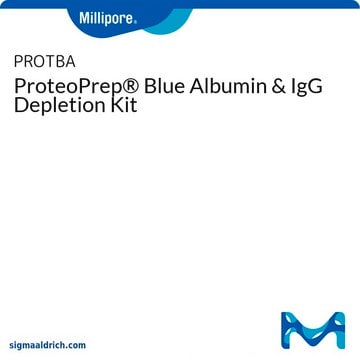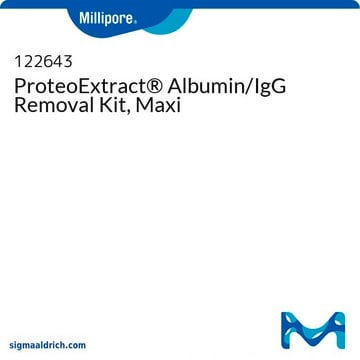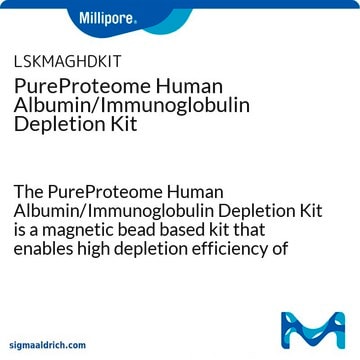PROTIA
ProteoPrep® Immunoaffinity Albumin & IgG Depletion Kit
Sign Into View Organizational & Contract Pricing
All Photos(1)
About This Item
UNSPSC Code:
41106500
NACRES:
NA.56
Recommended Products
technique(s)
immunodepletion: suitable
storage temp.
2-8°C
Related Categories
General description
ProteoPrep® Immunoaffinity Albumin and IgG Depletion Kit might be a useful tool for novel biomarker discovery.
The ProteoPrep® Immunoaffinity medium in the prepacked spin columns is a mixture of two-beaded media containing recombinantly expressed, small single-chain antibody ligands, resulting in low non-specific binding and high capacity. The ProteoPrep Immunoaffinity Albumin and IgG Depletion Kit has been designed to specifically remove albumin and IgG from human serum (25-50μL) in preparation of samples for proteomics analysis, two-dimensional electrophoresis (2DE) or liquid chromatography (LC). This kit is also effective in depleting albumin and IgG from mouse and guinea pig serum.
Application
ProteoPrep® Immunoaffinity Albumin & amp; IgG Depletion Kit has been used in:
- umbilical cord serum proteomics
- human plasma (HP) proteomics
- proteomic profile-based screening of potential protein biomarkers in the urine of patients with nephrotic syndrome
Features and Benefits
- High Capacity removes more interfering abundant proteins
- High Specifity ensures you see an accurate and more complete proteome
- Buffer systems are compatible with 2 dimensional electrophoresis so there are no intermediate time consuming steps that might result in protein loss
Legal Information
ProteoPrep is a registered trademark of Merck KGaA, Darmstadt, Germany
signalword
Warning
Hazard Classifications
Acute Tox. 4 Oral - Aquatic Chronic 2 - Carc. 2 - Eye Irrit. 2 - Repr. 2 - Skin Irrit. 2 - Skin Sens. 1
Storage Class
10 - Combustible liquids
Certificates of Analysis (COA)
Search for Certificates of Analysis (COA) by entering the products Lot/Batch Number. Lot and Batch Numbers can be found on a product’s label following the words ‘Lot’ or ‘Batch’.
Already Own This Product?
Find documentation for the products that you have recently purchased in the Document Library.
Nick A Bersinger et al.
International journal of reproductive medicine, 2021, 2906164-2906164 (2021-02-13)
The follicular fluid (FF) plays an essential role in the physiology of the follicle and the oocyte. Gonadotropin stimulation affects the FF steroid hormone and anti-Mullerian hormone (AMH) concentrations, which has been suggested to be the reason for lower oocyte
Yu Wang et al.
Molecular medicine reports, 16(5), 6276-6284 (2017-08-30)
Nephrotic syndrome is not a single disease; rather, it is a term for numerous diseases and pathological types. Renal biopsy is of use in determining the diagnosis and prognosis, and for guiding treatment; however, the use of this intervention is
Christophe Schmitt et al.
Journal of cardiovascular pharmacology, 65(6), 611-619 (2015-02-26)
Inclacumab, a novel monoclonal antibody against P-selectin in development for the treatment and prevention of atherosclerotic cardiovascular diseases, was administered in an ascending single-dose study as intravenous infusion to evaluate safety, pharmacokinetics, and pharmacodynamics. Fifty-six healthy subjects were enrolled in
Alejandro Gomez Toledo et al.
Molecular & cellular proteomics : MCP, 14(12), 3118-3131 (2015-09-27)
The inter-α-trypsin inhibitor complex is a macromolecular arrangement of structurally related heavy chain proteins covalently cross-linked to the chondroitin sulfate (CS) chain of the proteoglycan bikunin. The inter-α-trypsin inhibitor complex is abundant in plasma and associated with inflammation, kidney diseases
Jemmyson Romário de Jesus et al.
Analytical and bioanalytical chemistry, 407(3), 661-667 (2014-12-01)
In this manuscript we briefly describe bipolar disorder (a depressive and manic mental disease), its classification, its effects on the patient, which sometimes include suicidal tendencies, and the drugs used for treatment. We also address the status quo with regard
Our team of scientists has experience in all areas of research including Life Science, Material Science, Chemical Synthesis, Chromatography, Analytical and many others.
Contact Technical Service











